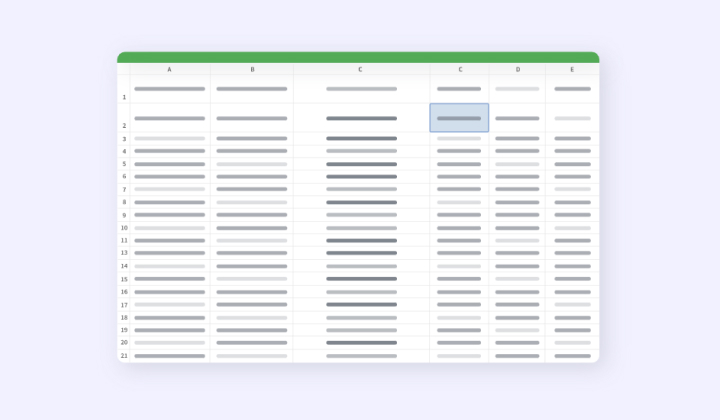Spreadsheets in SMEs: Assessing the risks

Spreadsheets have been ubiquitous in business operations for over half a century, enabling companies to organise their data and track customer information among many other things.
Low cost and relatively easy to use, spreadsheets continue to be an attractive option for many SMEs looking to manage their data. In fact, findings from our recent whitepaper show that over a third of businesses mainly use spreadsheets in their current software setup.
But while spreadsheets are a necessity for many, they continue to pose a threat to operations and security. Only last year a spreadsheet revealing students estimated and awarded grades for exams was leaked at a school in Scotland after a cyber attack. This costly mistake not only compromised student privacy but also highlighted the urgent need for secure data management practices and an alternative to relying solely on separate spreadsheets for sensitive information.
And this is just one recent example of the security risk that spreadsheets pose; there are countless other incidents where a similar spreadsheet error has snowballed into major financial disasters.
With evidence suggesting that SMEs are actually aware of the risks that come with spreadsheets, we inspect some of the reasons why businesses continue to use spreadsheets and evaluate the risks that this software holds. Drawing on our survey of 500 SME decision makers across multiple industries, this article shows why now might be the best time to transition to a more secure, scalable alternative.
The familiarity of spreadsheet software
SMEs may continue to use spreadsheet software as their primary tool for managing data because they have a long been the choice for small and enterprise-level companies alike. Spreadsheets have been called the “universal language for data analysis”, and they often come installed on many computers.
Microsoft Excel remains the most popular spreadsheet tool, with 750 million+ users globally, with other tools like Google Sheets and Apple Numbers offering a similar service. With so many spreadsheet offerings out there, it’s very likely that you’ve encountered these tools before.
Although spreadsheets pose significant risks for businesses, their familiarity has led business leaders and employees to continue using them in their processes. As a result, it’s not surprising that 98% of SMEs rely on spreadsheets for critical business tasks.
The most frequent uses of spreadsheets are managing stock levels (31.5%), customer data (28.9%) and employee data (25.6%). Further to this, 34% of respondents have also reported using spreadsheets for tracking invoices.
Spreadsheets have their usefulness in handling static data, but for mission-critical tasks, there are more effective alternatives. In fact, the disadvantages of spreadsheets are numerous.
SMEs are aware of the disadvantages of spreadsheets
Spreadsheets have been widely used in business operations for decades, allowing companies to organise data and track customer information. However, the convenience and popularity of spreadsheets come with inherent risks, including the potential for human error.
Based on our whitepaper research, it is evident that users are growing more concerned about the security risks associated with spreadsheets. In fact, 33% of the surveyed organizations expressed worry regarding the vulnerability of storing critical information on spreadsheets, while 21% exhibited anxiety towards existing software storage methods.
Further still, only 8% of those surveyed have no concerns about using spreadsheets. It is clear, therefore, that users are aware of the dangers that spreadsheets pose.
Spreadsheets may suffice for SMEs in the beginning, but they lack the flexibility to accommodate scaling operations as a business grows. With increased projects, multiple spreadsheets may be necessary, which can jeopardise security and accessibility.
Tailored Solutions for SMEs
When it comes to the needs of SMEs, such as secure data storage and easy accessibility, finding a flexible and scalable work management platform is crucial. Instead of focusing solely on spreadsheets, consider a solution that can adapt to your business requirements without the need for extensive coding.
With the right work management platform, you can efficiently organise information and streamline operations, even without coding experience. Whether it’s creating a project management tool, an asset library, a 100 day marketing plan or other essential applications, you can have the power to customise your digital workspace to suit your specific needs.
One of the significant advantages of modern work management platforms is their cloud-based nature. These cloud-based services ensure secure data backup whilst allowing employees to access information from anywhere, an invaluable feature in today’s hybrid work landscape. Additionally, by centralising data in a single location, these platforms promote collaboration and provide a reliable source of truth for all teams, eliminating the confusion caused by multiple versions of spreadsheets.
Embrace a work management platform that offers the flexibility and scalability SMEs require, empowering your business to thrive in a digital-driven world. Say goodbye to manual processes and fragmented data and welcome streamlined workflows with a tailored solution.
Manage your data in Gridfox
Efficient data analysis is crucial for business owners to gain insights. However, relying on spreadsheets often leads to manual effort that can decrease productivity.
Gridfox offers a diverse range of fields that permit users to refine their data based on selected criteria. Moving away from spreadsheets to a work management platform like Gridfox allows users to extract more value out of their data, providing businesses with a competitive advantage necessary for their success.
Gridfox facilitates a seamless transition process for users. The platform enables the importation of data from any pre-existing spreadsheets, ensuring uninterrupted operations and maintenance of productivity levels.
Want to find out more? Get started with Gridfox free here.

